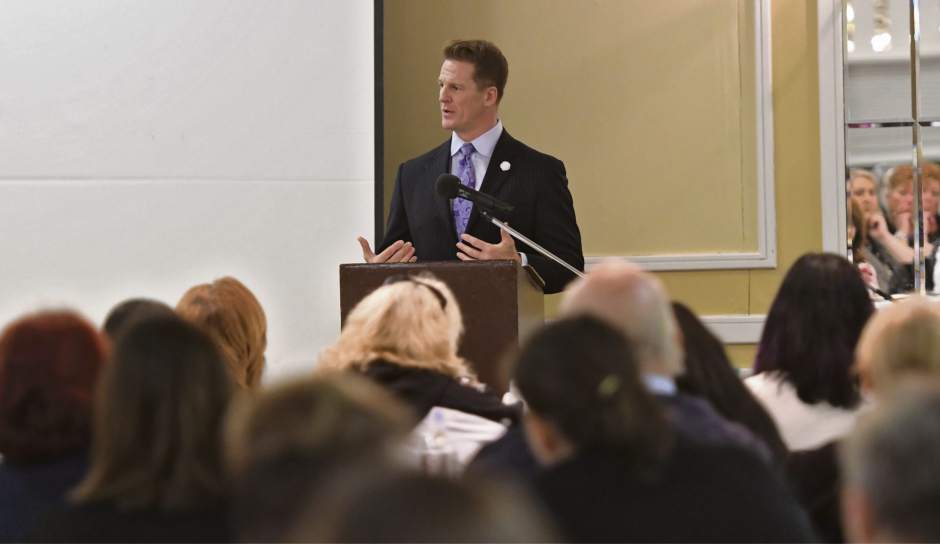State of opioid epidemic discussed at New Kensington summit
Drug or alcohol addiction doesn't impact addicts alone.
While Narcotics Anonymous helps addicts and other groups like Nar-Anon help an addict's family, Alle-Kiski Valley people in the know realize much more must be done.
Just how to do that was the focus of a conference Wednesday in New Kensington.
The summit was sponsored by the Pennsylvania Family Support Alliance and the Westmoreland Drug and Alcohol Commission.
Jason Snyder, special assistant to the state secretary of the Department of Human Services, described centers for excellence set up by state to expand drug treatment.
“We are in the worst public health crisis in the past 25 years,” he said, explaining what the state is considering and encouraging addictions counselors and others to comment.
Numerous ideas surfaced.
Westmoreland County's opiate death rate is high, but the commission, hospitals and treatment services are addressing it and looking for ways to improve, commission Executive Director Colleen Hughes said.
“We do want to let people know we have services and a ‘warm handoff' from a hospital to services,” she said.
“Money is the big problem,” said VonZell Wade, clinical director of SpiritLife in Indiana. Pa., and cofounder of Lost Dreams Awakening at New Kensington.
“One of the biggest challenges continues to be funding,” he said. “We need more people engaged in treatment for long term, not short term. We need more for drug and alcohol programs and more money for support services.”
Louis E. Wagoner Jr., SpiritLife's executive director, said politicians and bureaucrats are misleading people when they say there is a drug treatment beds shortage.
“There are plenty of beds out there,” he said. “... There is no funding out there for additional beds. Currently, only one in 10 people who need inpatient treatment in Pennsylvania is getting it.”
There is only one, 25-bed halfway house for women addicts in Pittsburgh yet state legislators in Harrisburg are talking about closing halfway houses, he said.
Snyder had left New Kensington for another conference by the time Wagoner spoke and was not available for comment.
Medical views
Physicans must deal with chronic pain and any related behavioral and general health issues in addicts, said Dr. Jonathan Han of UPMC St. Margaret hospital near Aspinwall.
Keeping painkillers from addicts without otherwise treating their pain and behavioral health needs, such as depression, isn't helpful, Han said. It might simply encourage them to use heroin and other illicit drugs.
Insurance companies must pay for painkiller alternatives, such as acupuncture, hypnosis, or other modalities to treat pain, he said.
“We also need to re-socialize people, attach them to their communities and families,” Han said. “And that is going to require a radical change in the way we take care of people.”
Need to help children
Dana DeFonso, of Southwestern Pennsylvania Human Services Behavorial Health, said children are often affected by addiction because of abuse in the home, drug or alcohol addiction by parents or societal problems that lead to depression.
“Children need special care,” she said. “We need to focus on them.”
Westmoreland County's Children Bureau has seen a consistent increase in opiate addiction referrals in the last three years, said Executive Director Shara B. Saveikis. As a result, the agency has changed some of what it does.
“Earlier identification of addiction in a family allows the bureau to change its threshold for our drug testing so we have can a better identification when a parent is using,” she said. “We also provide a lot of services so they are getting the right services at the time drug use is identified.”
The bureau has experienced a 35 percent reduction in placement of children as a result of addiction, due to earlier identification and frontloading services to the family, Saveikis said.
Chuck Biedka is a Tribune-Review staff writer. Reach him at 724-226-4711, cbiedka@tribweb.com or via Twitter @Chuck Biedka.

